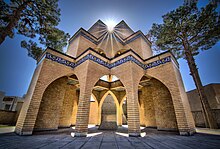
Back حسين الكاشفي Arabic Hüseyn Vaiz Kaşifi Azerbaijani حسین واعظ کاشفی Persian حسین واعظ کاشفی PNB Хусейн Ваиз Кашифи Russian Ҳусайн Воизи Кошифӣ Tajik Hüseyin Vâiz-i Kâşifî Turkish ملا حسین واعظ کاشفی Urdu Husayn Voiz Koshifiy Uzbek
Mawlana Husayn Wa'ez Kashifi مولانا حسین واعظ کاشفی | |
|---|---|
 A memorial in his birthtown, Sabzevar. | |
| Title | Kamal al-Din |
| Personal life | |
| Born | 840 AH = 1436 CE |
| Died | 910 AH = 1504 CE Herat (modern-day Afghanistan) |
| Era | Timurid Empire |
| Region | Greater Khorasan |
| Main interest(s) | Tafsir, Persian literature, Sufism, Astronomy |
| Notable work(s) | Akhlaq-e Mohseni, Anwar-e Sohaili, Jawaher al-Tafsir, Mawaheb-e 'Aliyya |
| Occupation | scholar, poet and astronomer |
| Religious life | |
| Religion | Islam |
| Denomination | Sunni Islam[1][2] |
| Jurisprudence | Hanafi[1][2] |
| Creed | Maturidi |
| Muslim leader | |
Kamāl al-Dīn Ḥusayn ibn ʿAlī Kāshifī,[3][a] Persian: کمالالدین حسین بن علی سبزواری best simply known as Husayn Kashifi, Persian: مولانا حسین واعظ کاشفی was a prolific Persian[3] prose-stylist, a poet, a Quran exegete, a Sufi scholar, and an astronomer of the Timurid era. Kashifi was his pen name, whereas his surname al-Wāʿiẓ ("the preacher")[3][b] denoted his professional occupation.
He spent most of his career in Herat, where his academic activities were supported by Ali-Shir Nava'i, a senior vizier in the Timurid court during Sultan Husayn Bayqara's rule, hence the reason for Kashifi to dedicate most of his works to Nava'i. He was also very close to the famous Persian poet and Sufi, Nur al-Din 'Abd al-Rahman Jami.
His famous works include Akhlaq-e Mohseni and Anwar-e Sohaili in Persian prose, and Jawaher al-Tafsir and Mawaheb-e 'Aliyya which are Persian tafsirs of the Quran.
- ^ a b c d Subtelny, M. E . (2011). "KĀŠEFI, KAMĀL-AL-DIN ḤOSAYN WĀʿEẒ". In Yarshater, Ehsan (ed.). Encyclopædia Iranica. Vol. XV/6: Karim Khan Zand–Kašḡari, Saʿd-al-Din. London and New York: Routledge & Kegan Paul. pp. 658–661. ISBN 978-1-934283-29-5.
- ^ a b Ayazi, Sayd Muhammad Ali, 1380/1999, Naqd wa ma'refi-ye ketab: Jawaher al-Tafsir-e Mulla Hussein Kashifi, Ayyina-ye Miras, Issue No. 12, pp. 52-56.
- ^ a b c Hosein Yousofi 1978.
Cite error: There are <ref group=lower-alpha> tags or {{efn}} templates on this page, but the references will not show without a {{reflist|group=lower-alpha}} template or {{notelist}} template (see the help page).